Women Entrepreneurship in China
VerifiedAdded on 2019/12/03
|29
|10794
|175
Report
AI Summary
This comprehensive report investigates the success of women entrepreneurs in China. It explores the economic landscape of China and its impact on women's entrepreneurial journeys. The report delves into the profiles of successful Chinese women entrepreneurs, analyzing factors contributing to their success, including education, economic independence, social status, and family background. It also examines the challenges faced by women entrepreneurs in China, such as access to finance, societal expectations, and cultural barriers. The report concludes by offering recommendations for future research and highlighting the significant contribution of women entrepreneurs to China's economic development and global economy.

Women Entrepreneurship in China
Paraphrase This Document
Need a fresh take? Get an instant paraphrase of this document with our AI Paraphraser
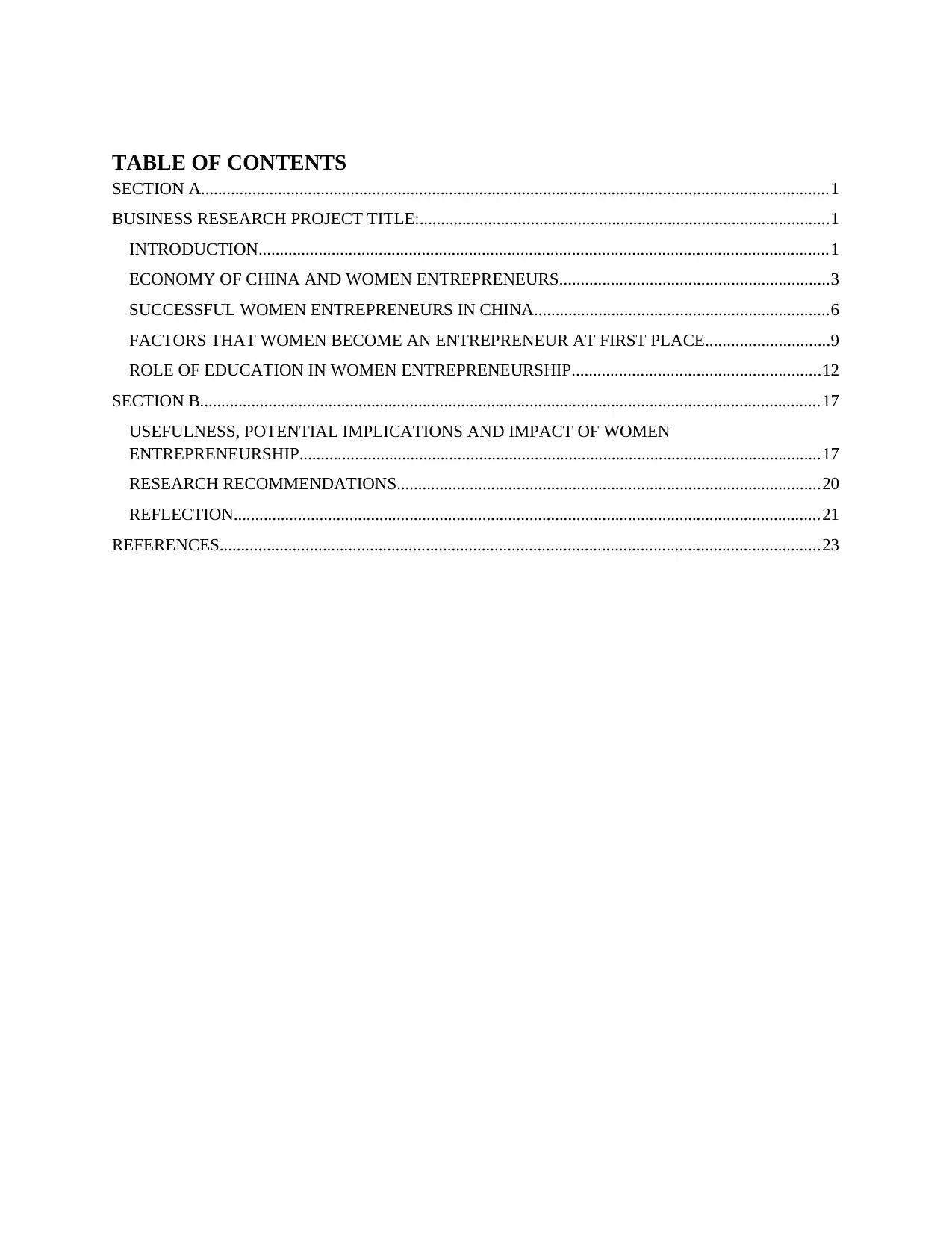
TABLE OF CONTENTS
SECTION A...................................................................................................................................................1
BUSINESS RESEARCH PROJECT TITLE:................................................................................................1
INTRODUCTION.....................................................................................................................................1
ECONOMY OF CHINA AND WOMEN ENTREPRENEURS...............................................................3
SUCCESSFUL WOMEN ENTREPRENEURS IN CHINA.....................................................................6
FACTORS THAT WOMEN BECOME AN ENTREPRENEUR AT FIRST PLACE.............................9
ROLE OF EDUCATION IN WOMEN ENTREPRENEURSHIP..........................................................12
SECTION B.................................................................................................................................................17
USEFULNESS, POTENTIAL IMPLICATIONS AND IMPACT OF WOMEN
ENTREPRENEURSHIP..........................................................................................................................17
RESEARCH RECOMMENDATIONS...................................................................................................20
REFLECTION.........................................................................................................................................21
REFERENCES............................................................................................................................................23
SECTION A...................................................................................................................................................1
BUSINESS RESEARCH PROJECT TITLE:................................................................................................1
INTRODUCTION.....................................................................................................................................1
ECONOMY OF CHINA AND WOMEN ENTREPRENEURS...............................................................3
SUCCESSFUL WOMEN ENTREPRENEURS IN CHINA.....................................................................6
FACTORS THAT WOMEN BECOME AN ENTREPRENEUR AT FIRST PLACE.............................9
ROLE OF EDUCATION IN WOMEN ENTREPRENEURSHIP..........................................................12
SECTION B.................................................................................................................................................17
USEFULNESS, POTENTIAL IMPLICATIONS AND IMPACT OF WOMEN
ENTREPRENEURSHIP..........................................................................................................................17
RESEARCH RECOMMENDATIONS...................................................................................................20
REFLECTION.........................................................................................................................................21
REFERENCES............................................................................................................................................23
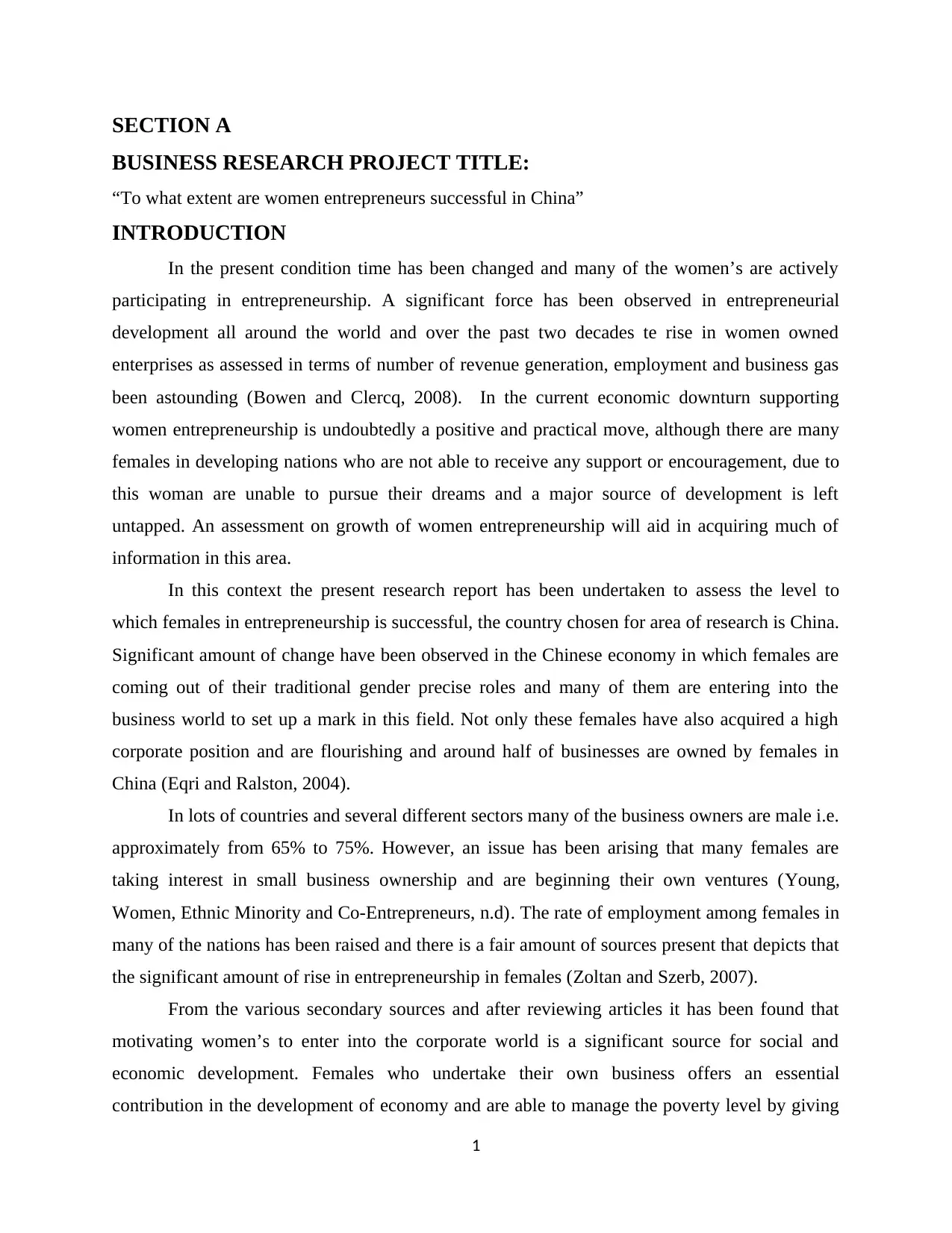
SECTION A
BUSINESS RESEARCH PROJECT TITLE:
“To what extent are women entrepreneurs successful in China”
INTRODUCTION
In the present condition time has been changed and many of the women’s are actively
participating in entrepreneurship. A significant force has been observed in entrepreneurial
development all around the world and over the past two decades te rise in women owned
enterprises as assessed in terms of number of revenue generation, employment and business gas
been astounding (Bowen and Clercq, 2008). In the current economic downturn supporting
women entrepreneurship is undoubtedly a positive and practical move, although there are many
females in developing nations who are not able to receive any support or encouragement, due to
this woman are unable to pursue their dreams and a major source of development is left
untapped. An assessment on growth of women entrepreneurship will aid in acquiring much of
information in this area.
In this context the present research report has been undertaken to assess the level to
which females in entrepreneurship is successful, the country chosen for area of research is China.
Significant amount of change have been observed in the Chinese economy in which females are
coming out of their traditional gender precise roles and many of them are entering into the
business world to set up a mark in this field. Not only these females have also acquired a high
corporate position and are flourishing and around half of businesses are owned by females in
China (Eqri and Ralston, 2004).
In lots of countries and several different sectors many of the business owners are male i.e.
approximately from 65% to 75%. However, an issue has been arising that many females are
taking interest in small business ownership and are beginning their own ventures (Young,
Women, Ethnic Minority and Co-Entrepreneurs, n.d). The rate of employment among females in
many of the nations has been raised and there is a fair amount of sources present that depicts that
the significant amount of rise in entrepreneurship in females (Zoltan and Szerb, 2007).
From the various secondary sources and after reviewing articles it has been found that
motivating women’s to enter into the corporate world is a significant source for social and
economic development. Females who undertake their own business offers an essential
contribution in the development of economy and are able to manage the poverty level by giving
1
BUSINESS RESEARCH PROJECT TITLE:
“To what extent are women entrepreneurs successful in China”
INTRODUCTION
In the present condition time has been changed and many of the women’s are actively
participating in entrepreneurship. A significant force has been observed in entrepreneurial
development all around the world and over the past two decades te rise in women owned
enterprises as assessed in terms of number of revenue generation, employment and business gas
been astounding (Bowen and Clercq, 2008). In the current economic downturn supporting
women entrepreneurship is undoubtedly a positive and practical move, although there are many
females in developing nations who are not able to receive any support or encouragement, due to
this woman are unable to pursue their dreams and a major source of development is left
untapped. An assessment on growth of women entrepreneurship will aid in acquiring much of
information in this area.
In this context the present research report has been undertaken to assess the level to
which females in entrepreneurship is successful, the country chosen for area of research is China.
Significant amount of change have been observed in the Chinese economy in which females are
coming out of their traditional gender precise roles and many of them are entering into the
business world to set up a mark in this field. Not only these females have also acquired a high
corporate position and are flourishing and around half of businesses are owned by females in
China (Eqri and Ralston, 2004).
In lots of countries and several different sectors many of the business owners are male i.e.
approximately from 65% to 75%. However, an issue has been arising that many females are
taking interest in small business ownership and are beginning their own ventures (Young,
Women, Ethnic Minority and Co-Entrepreneurs, n.d). The rate of employment among females in
many of the nations has been raised and there is a fair amount of sources present that depicts that
the significant amount of rise in entrepreneurship in females (Zoltan and Szerb, 2007).
From the various secondary sources and after reviewing articles it has been found that
motivating women’s to enter into the corporate world is a significant source for social and
economic development. Females who undertake their own business offers an essential
contribution in the development of economy and are able to manage the poverty level by giving
1
⊘ This is a preview!⊘
Do you want full access?
Subscribe today to unlock all pages.

Trusted by 1+ million students worldwide
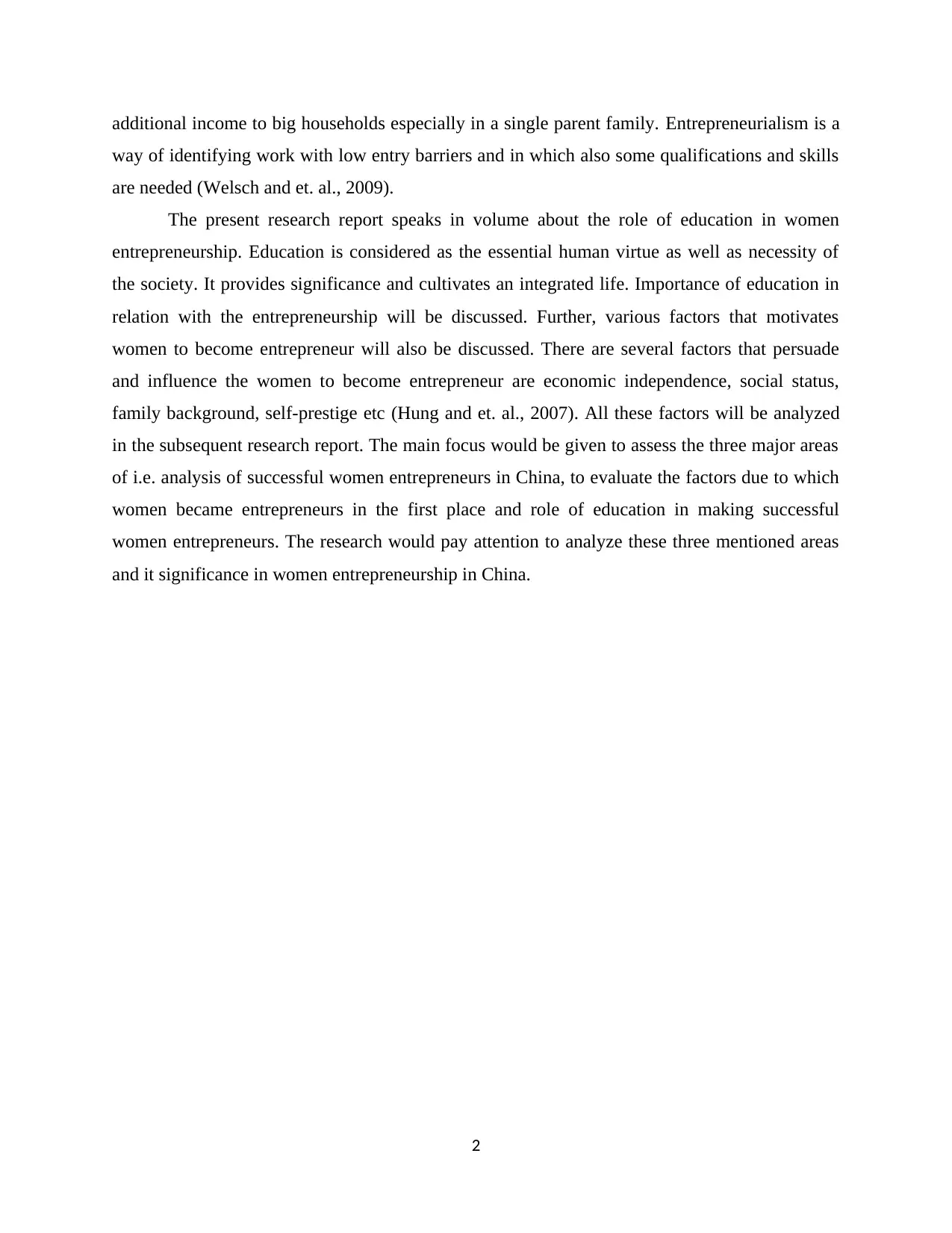
additional income to big households especially in a single parent family. Entrepreneurialism is a
way of identifying work with low entry barriers and in which also some qualifications and skills
are needed (Welsch and et. al., 2009).
The present research report speaks in volume about the role of education in women
entrepreneurship. Education is considered as the essential human virtue as well as necessity of
the society. It provides significance and cultivates an integrated life. Importance of education in
relation with the entrepreneurship will be discussed. Further, various factors that motivates
women to become entrepreneur will also be discussed. There are several factors that persuade
and influence the women to become entrepreneur are economic independence, social status,
family background, self-prestige etc (Hung and et. al., 2007). All these factors will be analyzed
in the subsequent research report. The main focus would be given to assess the three major areas
of i.e. analysis of successful women entrepreneurs in China, to evaluate the factors due to which
women became entrepreneurs in the first place and role of education in making successful
women entrepreneurs. The research would pay attention to analyze these three mentioned areas
and it significance in women entrepreneurship in China.
2
way of identifying work with low entry barriers and in which also some qualifications and skills
are needed (Welsch and et. al., 2009).
The present research report speaks in volume about the role of education in women
entrepreneurship. Education is considered as the essential human virtue as well as necessity of
the society. It provides significance and cultivates an integrated life. Importance of education in
relation with the entrepreneurship will be discussed. Further, various factors that motivates
women to become entrepreneur will also be discussed. There are several factors that persuade
and influence the women to become entrepreneur are economic independence, social status,
family background, self-prestige etc (Hung and et. al., 2007). All these factors will be analyzed
in the subsequent research report. The main focus would be given to assess the three major areas
of i.e. analysis of successful women entrepreneurs in China, to evaluate the factors due to which
women became entrepreneurs in the first place and role of education in making successful
women entrepreneurs. The research would pay attention to analyze these three mentioned areas
and it significance in women entrepreneurship in China.
2
Paraphrase This Document
Need a fresh take? Get an instant paraphrase of this document with our AI Paraphraser
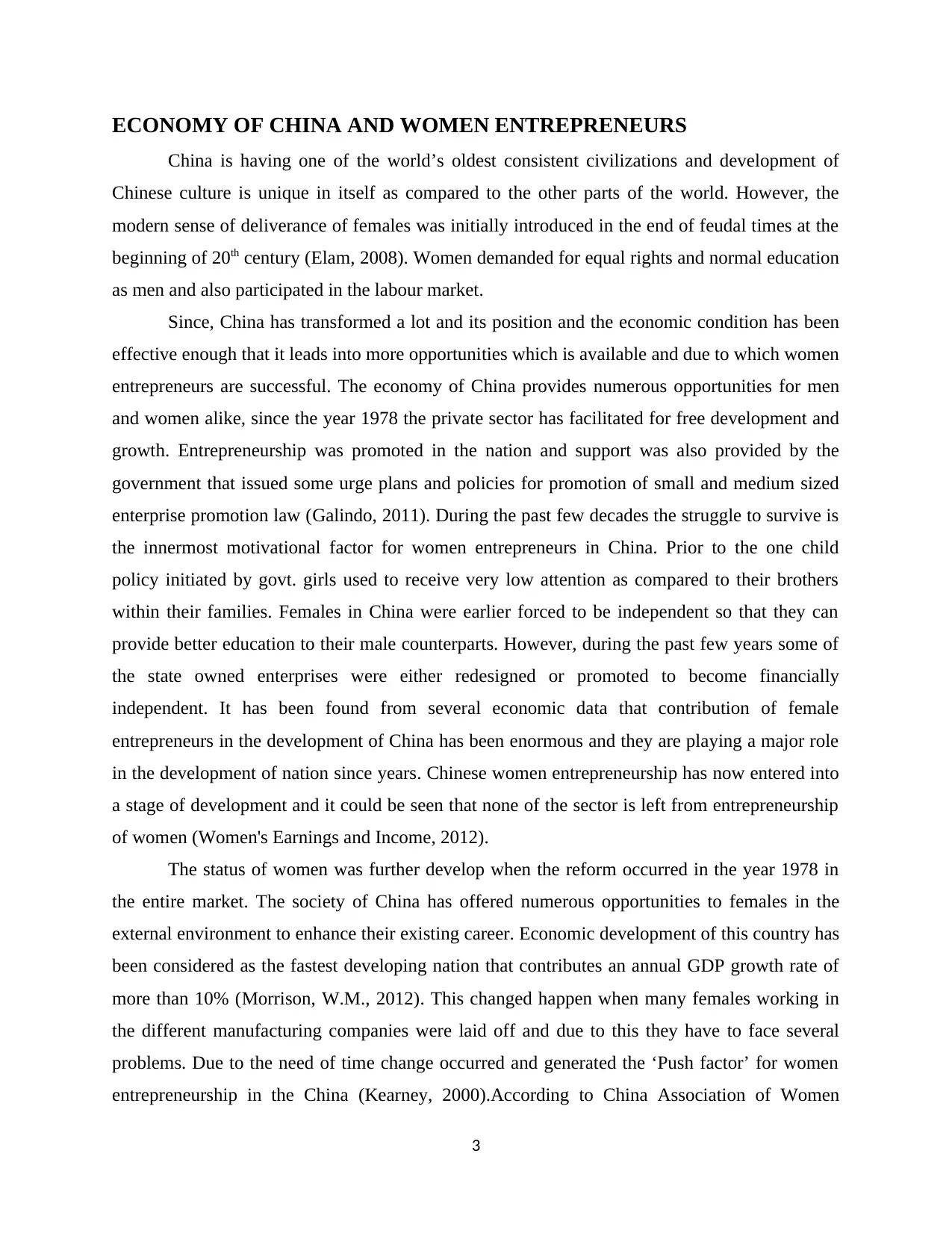
ECONOMY OF CHINA AND WOMEN ENTREPRENEURS
China is having one of the world’s oldest consistent civilizations and development of
Chinese culture is unique in itself as compared to the other parts of the world. However, the
modern sense of deliverance of females was initially introduced in the end of feudal times at the
beginning of 20th century (Elam, 2008). Women demanded for equal rights and normal education
as men and also participated in the labour market.
Since, China has transformed a lot and its position and the economic condition has been
effective enough that it leads into more opportunities which is available and due to which women
entrepreneurs are successful. The economy of China provides numerous opportunities for men
and women alike, since the year 1978 the private sector has facilitated for free development and
growth. Entrepreneurship was promoted in the nation and support was also provided by the
government that issued some urge plans and policies for promotion of small and medium sized
enterprise promotion law (Galindo, 2011). During the past few decades the struggle to survive is
the innermost motivational factor for women entrepreneurs in China. Prior to the one child
policy initiated by govt. girls used to receive very low attention as compared to their brothers
within their families. Females in China were earlier forced to be independent so that they can
provide better education to their male counterparts. However, during the past few years some of
the state owned enterprises were either redesigned or promoted to become financially
independent. It has been found from several economic data that contribution of female
entrepreneurs in the development of China has been enormous and they are playing a major role
in the development of nation since years. Chinese women entrepreneurship has now entered into
a stage of development and it could be seen that none of the sector is left from entrepreneurship
of women (Women's Earnings and Income, 2012).
The status of women was further develop when the reform occurred in the year 1978 in
the entire market. The society of China has offered numerous opportunities to females in the
external environment to enhance their existing career. Economic development of this country has
been considered as the fastest developing nation that contributes an annual GDP growth rate of
more than 10% (Morrison, W.M., 2012). This changed happen when many females working in
the different manufacturing companies were laid off and due to this they have to face several
problems. Due to the need of time change occurred and generated the ‘Push factor’ for women
entrepreneurship in the China (Kearney, 2000).According to China Association of Women
3
China is having one of the world’s oldest consistent civilizations and development of
Chinese culture is unique in itself as compared to the other parts of the world. However, the
modern sense of deliverance of females was initially introduced in the end of feudal times at the
beginning of 20th century (Elam, 2008). Women demanded for equal rights and normal education
as men and also participated in the labour market.
Since, China has transformed a lot and its position and the economic condition has been
effective enough that it leads into more opportunities which is available and due to which women
entrepreneurs are successful. The economy of China provides numerous opportunities for men
and women alike, since the year 1978 the private sector has facilitated for free development and
growth. Entrepreneurship was promoted in the nation and support was also provided by the
government that issued some urge plans and policies for promotion of small and medium sized
enterprise promotion law (Galindo, 2011). During the past few decades the struggle to survive is
the innermost motivational factor for women entrepreneurs in China. Prior to the one child
policy initiated by govt. girls used to receive very low attention as compared to their brothers
within their families. Females in China were earlier forced to be independent so that they can
provide better education to their male counterparts. However, during the past few years some of
the state owned enterprises were either redesigned or promoted to become financially
independent. It has been found from several economic data that contribution of female
entrepreneurs in the development of China has been enormous and they are playing a major role
in the development of nation since years. Chinese women entrepreneurship has now entered into
a stage of development and it could be seen that none of the sector is left from entrepreneurship
of women (Women's Earnings and Income, 2012).
The status of women was further develop when the reform occurred in the year 1978 in
the entire market. The society of China has offered numerous opportunities to females in the
external environment to enhance their existing career. Economic development of this country has
been considered as the fastest developing nation that contributes an annual GDP growth rate of
more than 10% (Morrison, W.M., 2012). This changed happen when many females working in
the different manufacturing companies were laid off and due to this they have to face several
problems. Due to the need of time change occurred and generated the ‘Push factor’ for women
entrepreneurship in the China (Kearney, 2000).According to China Association of Women
3
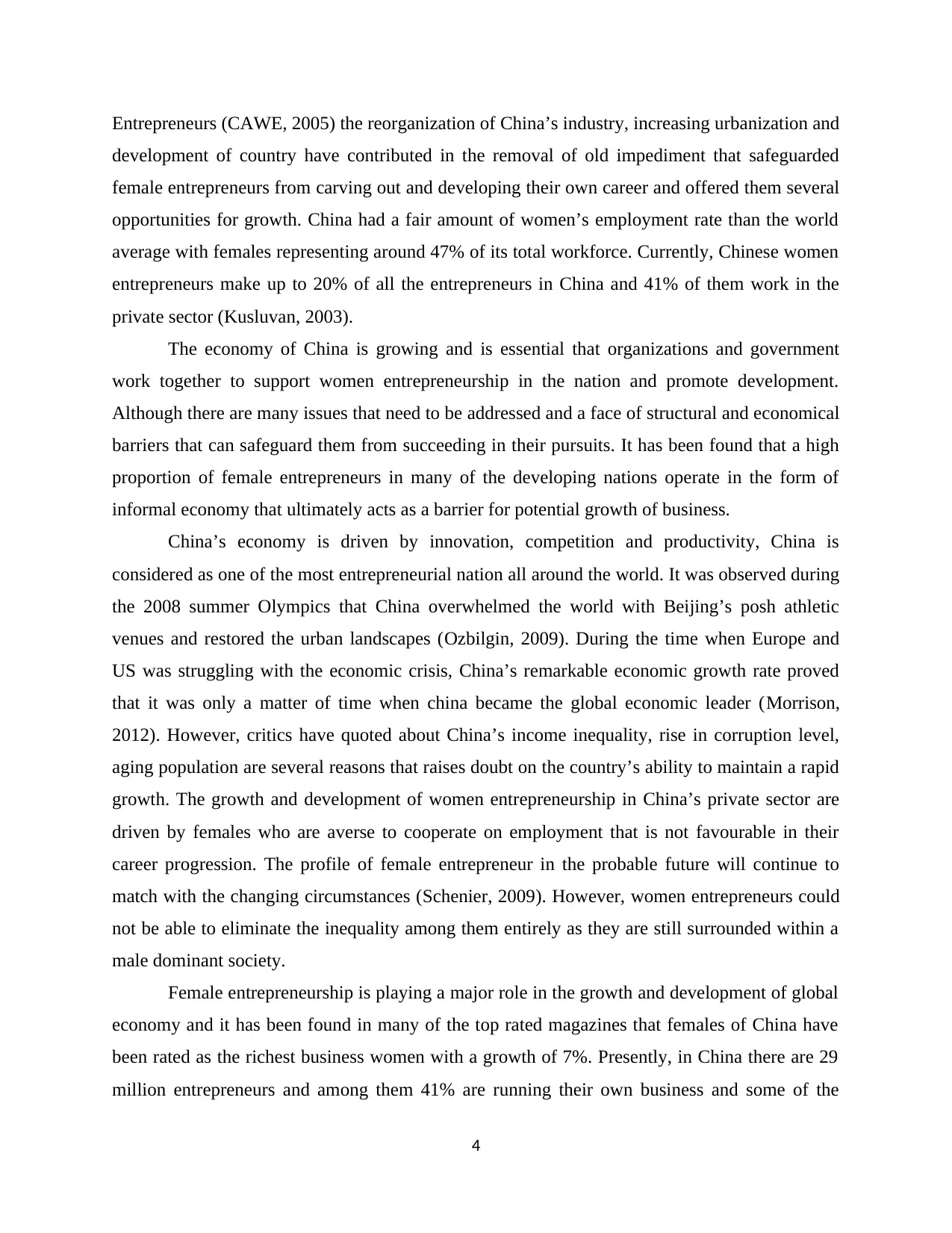
Entrepreneurs (CAWE, 2005) the reorganization of China’s industry, increasing urbanization and
development of country have contributed in the removal of old impediment that safeguarded
female entrepreneurs from carving out and developing their own career and offered them several
opportunities for growth. China had a fair amount of women’s employment rate than the world
average with females representing around 47% of its total workforce. Currently, Chinese women
entrepreneurs make up to 20% of all the entrepreneurs in China and 41% of them work in the
private sector (Kusluvan, 2003).
The economy of China is growing and is essential that organizations and government
work together to support women entrepreneurship in the nation and promote development.
Although there are many issues that need to be addressed and a face of structural and economical
barriers that can safeguard them from succeeding in their pursuits. It has been found that a high
proportion of female entrepreneurs in many of the developing nations operate in the form of
informal economy that ultimately acts as a barrier for potential growth of business.
China’s economy is driven by innovation, competition and productivity, China is
considered as one of the most entrepreneurial nation all around the world. It was observed during
the 2008 summer Olympics that China overwhelmed the world with Beijing’s posh athletic
venues and restored the urban landscapes (Ozbilgin, 2009). During the time when Europe and
US was struggling with the economic crisis, China’s remarkable economic growth rate proved
that it was only a matter of time when china became the global economic leader (Morrison,
2012). However, critics have quoted about China’s income inequality, rise in corruption level,
aging population are several reasons that raises doubt on the country’s ability to maintain a rapid
growth. The growth and development of women entrepreneurship in China’s private sector are
driven by females who are averse to cooperate on employment that is not favourable in their
career progression. The profile of female entrepreneur in the probable future will continue to
match with the changing circumstances (Schenier, 2009). However, women entrepreneurs could
not be able to eliminate the inequality among them entirely as they are still surrounded within a
male dominant society.
Female entrepreneurship is playing a major role in the growth and development of global
economy and it has been found in many of the top rated magazines that females of China have
been rated as the richest business women with a growth of 7%. Presently, in China there are 29
million entrepreneurs and among them 41% are running their own business and some of the
4
development of country have contributed in the removal of old impediment that safeguarded
female entrepreneurs from carving out and developing their own career and offered them several
opportunities for growth. China had a fair amount of women’s employment rate than the world
average with females representing around 47% of its total workforce. Currently, Chinese women
entrepreneurs make up to 20% of all the entrepreneurs in China and 41% of them work in the
private sector (Kusluvan, 2003).
The economy of China is growing and is essential that organizations and government
work together to support women entrepreneurship in the nation and promote development.
Although there are many issues that need to be addressed and a face of structural and economical
barriers that can safeguard them from succeeding in their pursuits. It has been found that a high
proportion of female entrepreneurs in many of the developing nations operate in the form of
informal economy that ultimately acts as a barrier for potential growth of business.
China’s economy is driven by innovation, competition and productivity, China is
considered as one of the most entrepreneurial nation all around the world. It was observed during
the 2008 summer Olympics that China overwhelmed the world with Beijing’s posh athletic
venues and restored the urban landscapes (Ozbilgin, 2009). During the time when Europe and
US was struggling with the economic crisis, China’s remarkable economic growth rate proved
that it was only a matter of time when china became the global economic leader (Morrison,
2012). However, critics have quoted about China’s income inequality, rise in corruption level,
aging population are several reasons that raises doubt on the country’s ability to maintain a rapid
growth. The growth and development of women entrepreneurship in China’s private sector are
driven by females who are averse to cooperate on employment that is not favourable in their
career progression. The profile of female entrepreneur in the probable future will continue to
match with the changing circumstances (Schenier, 2009). However, women entrepreneurs could
not be able to eliminate the inequality among them entirely as they are still surrounded within a
male dominant society.
Female entrepreneurship is playing a major role in the growth and development of global
economy and it has been found in many of the top rated magazines that females of China have
been rated as the richest business women with a growth of 7%. Presently, in China there are 29
million entrepreneurs and among them 41% are running their own business and some of the
4
⊘ This is a preview!⊘
Do you want full access?
Subscribe today to unlock all pages.

Trusted by 1+ million students worldwide
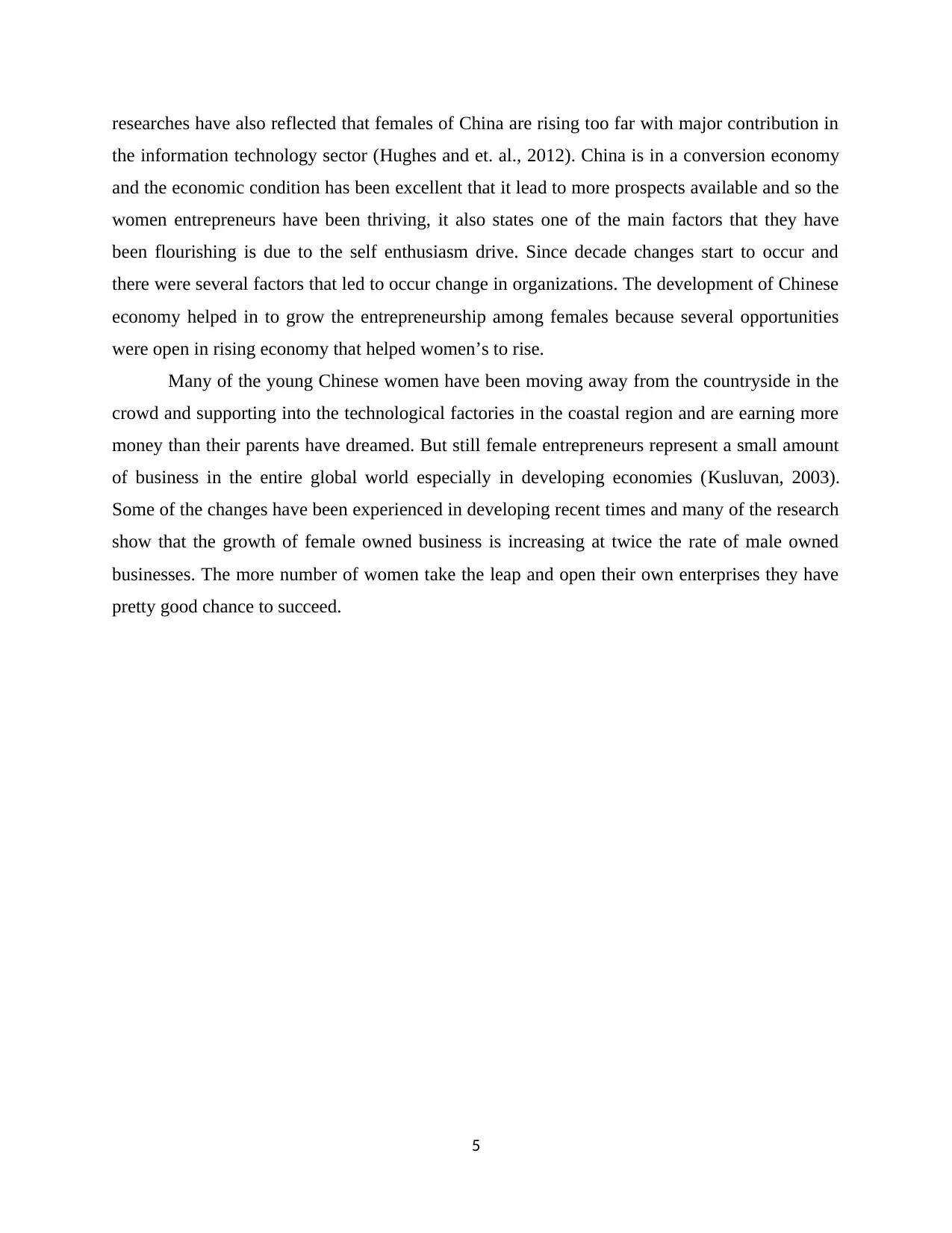
researches have also reflected that females of China are rising too far with major contribution in
the information technology sector (Hughes and et. al., 2012). China is in a conversion economy
and the economic condition has been excellent that it lead to more prospects available and so the
women entrepreneurs have been thriving, it also states one of the main factors that they have
been flourishing is due to the self enthusiasm drive. Since decade changes start to occur and
there were several factors that led to occur change in organizations. The development of Chinese
economy helped in to grow the entrepreneurship among females because several opportunities
were open in rising economy that helped women’s to rise.
Many of the young Chinese women have been moving away from the countryside in the
crowd and supporting into the technological factories in the coastal region and are earning more
money than their parents have dreamed. But still female entrepreneurs represent a small amount
of business in the entire global world especially in developing economies (Kusluvan, 2003).
Some of the changes have been experienced in developing recent times and many of the research
show that the growth of female owned business is increasing at twice the rate of male owned
businesses. The more number of women take the leap and open their own enterprises they have
pretty good chance to succeed.
5
the information technology sector (Hughes and et. al., 2012). China is in a conversion economy
and the economic condition has been excellent that it lead to more prospects available and so the
women entrepreneurs have been thriving, it also states one of the main factors that they have
been flourishing is due to the self enthusiasm drive. Since decade changes start to occur and
there were several factors that led to occur change in organizations. The development of Chinese
economy helped in to grow the entrepreneurship among females because several opportunities
were open in rising economy that helped women’s to rise.
Many of the young Chinese women have been moving away from the countryside in the
crowd and supporting into the technological factories in the coastal region and are earning more
money than their parents have dreamed. But still female entrepreneurs represent a small amount
of business in the entire global world especially in developing economies (Kusluvan, 2003).
Some of the changes have been experienced in developing recent times and many of the research
show that the growth of female owned business is increasing at twice the rate of male owned
businesses. The more number of women take the leap and open their own enterprises they have
pretty good chance to succeed.
5
Paraphrase This Document
Need a fresh take? Get an instant paraphrase of this document with our AI Paraphraser
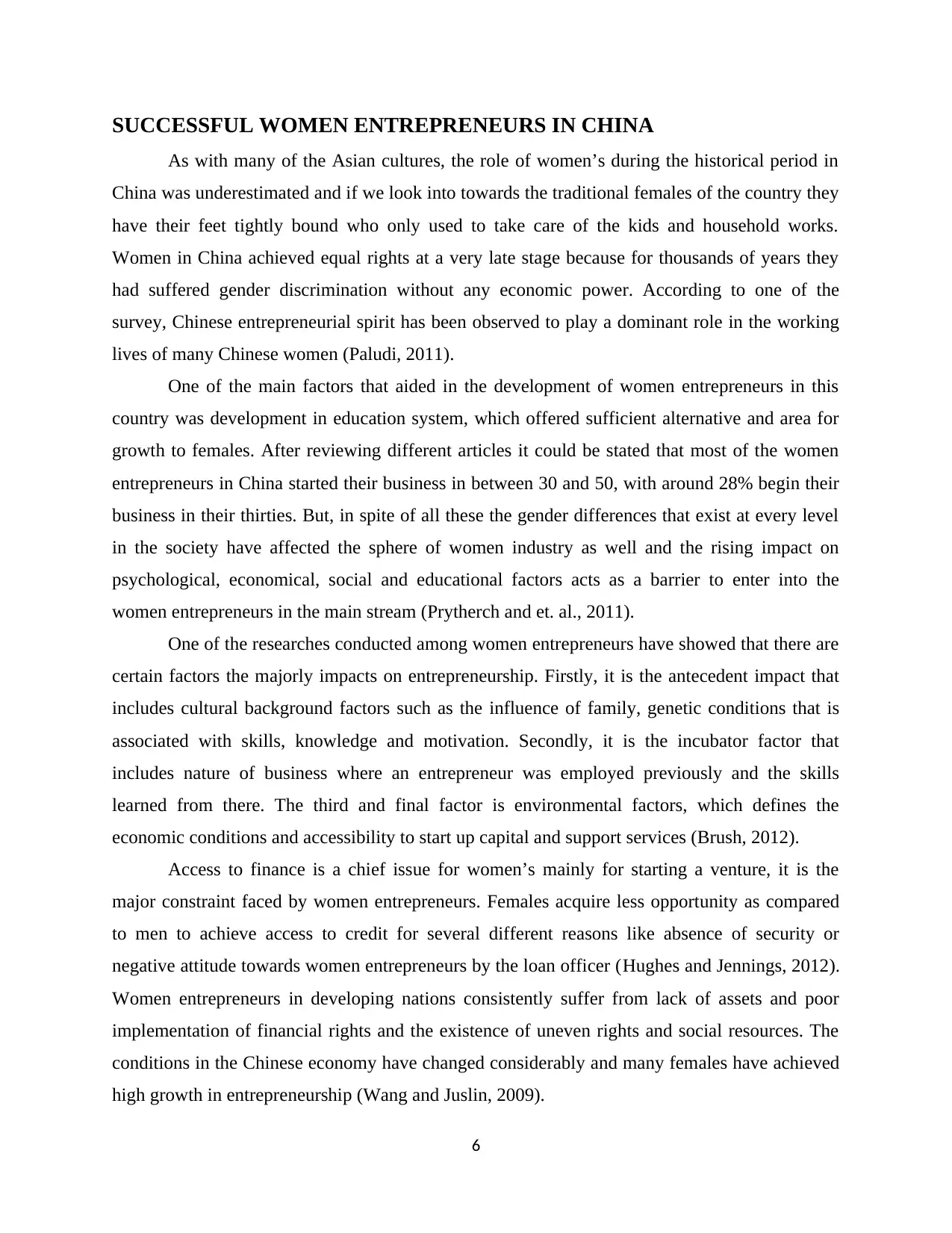
SUCCESSFUL WOMEN ENTREPRENEURS IN CHINA
As with many of the Asian cultures, the role of women’s during the historical period in
China was underestimated and if we look into towards the traditional females of the country they
have their feet tightly bound who only used to take care of the kids and household works.
Women in China achieved equal rights at a very late stage because for thousands of years they
had suffered gender discrimination without any economic power. According to one of the
survey, Chinese entrepreneurial spirit has been observed to play a dominant role in the working
lives of many Chinese women (Paludi, 2011).
One of the main factors that aided in the development of women entrepreneurs in this
country was development in education system, which offered sufficient alternative and area for
growth to females. After reviewing different articles it could be stated that most of the women
entrepreneurs in China started their business in between 30 and 50, with around 28% begin their
business in their thirties. But, in spite of all these the gender differences that exist at every level
in the society have affected the sphere of women industry as well and the rising impact on
psychological, economical, social and educational factors acts as a barrier to enter into the
women entrepreneurs in the main stream (Prytherch and et. al., 2011).
One of the researches conducted among women entrepreneurs have showed that there are
certain factors the majorly impacts on entrepreneurship. Firstly, it is the antecedent impact that
includes cultural background factors such as the influence of family, genetic conditions that is
associated with skills, knowledge and motivation. Secondly, it is the incubator factor that
includes nature of business where an entrepreneur was employed previously and the skills
learned from there. The third and final factor is environmental factors, which defines the
economic conditions and accessibility to start up capital and support services (Brush, 2012).
Access to finance is a chief issue for women’s mainly for starting a venture, it is the
major constraint faced by women entrepreneurs. Females acquire less opportunity as compared
to men to achieve access to credit for several different reasons like absence of security or
negative attitude towards women entrepreneurs by the loan officer (Hughes and Jennings, 2012).
Women entrepreneurs in developing nations consistently suffer from lack of assets and poor
implementation of financial rights and the existence of uneven rights and social resources. The
conditions in the Chinese economy have changed considerably and many females have achieved
high growth in entrepreneurship (Wang and Juslin, 2009).
6
As with many of the Asian cultures, the role of women’s during the historical period in
China was underestimated and if we look into towards the traditional females of the country they
have their feet tightly bound who only used to take care of the kids and household works.
Women in China achieved equal rights at a very late stage because for thousands of years they
had suffered gender discrimination without any economic power. According to one of the
survey, Chinese entrepreneurial spirit has been observed to play a dominant role in the working
lives of many Chinese women (Paludi, 2011).
One of the main factors that aided in the development of women entrepreneurs in this
country was development in education system, which offered sufficient alternative and area for
growth to females. After reviewing different articles it could be stated that most of the women
entrepreneurs in China started their business in between 30 and 50, with around 28% begin their
business in their thirties. But, in spite of all these the gender differences that exist at every level
in the society have affected the sphere of women industry as well and the rising impact on
psychological, economical, social and educational factors acts as a barrier to enter into the
women entrepreneurs in the main stream (Prytherch and et. al., 2011).
One of the researches conducted among women entrepreneurs have showed that there are
certain factors the majorly impacts on entrepreneurship. Firstly, it is the antecedent impact that
includes cultural background factors such as the influence of family, genetic conditions that is
associated with skills, knowledge and motivation. Secondly, it is the incubator factor that
includes nature of business where an entrepreneur was employed previously and the skills
learned from there. The third and final factor is environmental factors, which defines the
economic conditions and accessibility to start up capital and support services (Brush, 2012).
Access to finance is a chief issue for women’s mainly for starting a venture, it is the
major constraint faced by women entrepreneurs. Females acquire less opportunity as compared
to men to achieve access to credit for several different reasons like absence of security or
negative attitude towards women entrepreneurs by the loan officer (Hughes and Jennings, 2012).
Women entrepreneurs in developing nations consistently suffer from lack of assets and poor
implementation of financial rights and the existence of uneven rights and social resources. The
conditions in the Chinese economy have changed considerably and many females have achieved
high growth in entrepreneurship (Wang and Juslin, 2009).
6
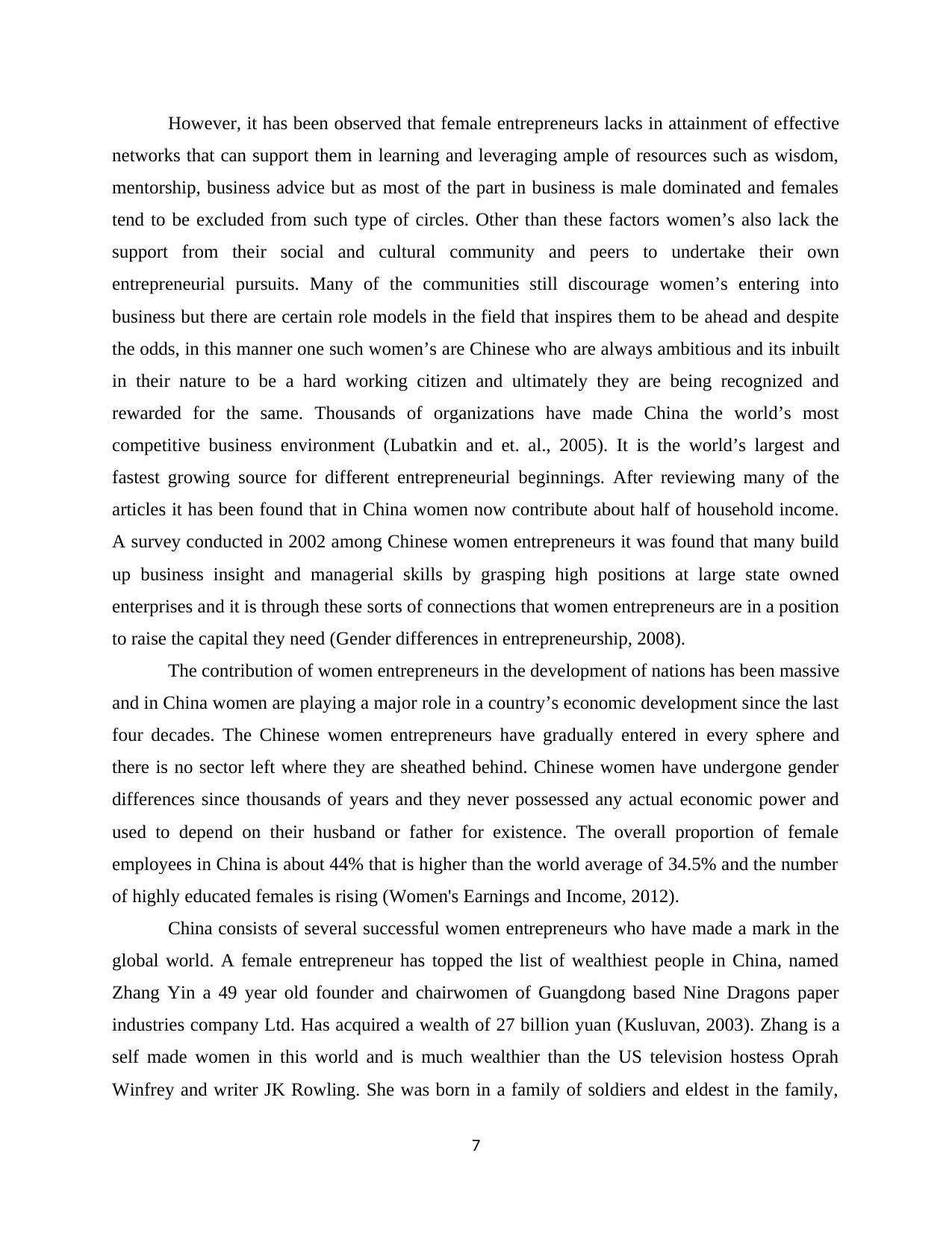
However, it has been observed that female entrepreneurs lacks in attainment of effective
networks that can support them in learning and leveraging ample of resources such as wisdom,
mentorship, business advice but as most of the part in business is male dominated and females
tend to be excluded from such type of circles. Other than these factors women’s also lack the
support from their social and cultural community and peers to undertake their own
entrepreneurial pursuits. Many of the communities still discourage women’s entering into
business but there are certain role models in the field that inspires them to be ahead and despite
the odds, in this manner one such women’s are Chinese who are always ambitious and its inbuilt
in their nature to be a hard working citizen and ultimately they are being recognized and
rewarded for the same. Thousands of organizations have made China the world’s most
competitive business environment (Lubatkin and et. al., 2005). It is the world’s largest and
fastest growing source for different entrepreneurial beginnings. After reviewing many of the
articles it has been found that in China women now contribute about half of household income.
A survey conducted in 2002 among Chinese women entrepreneurs it was found that many build
up business insight and managerial skills by grasping high positions at large state owned
enterprises and it is through these sorts of connections that women entrepreneurs are in a position
to raise the capital they need (Gender differences in entrepreneurship, 2008).
The contribution of women entrepreneurs in the development of nations has been massive
and in China women are playing a major role in a country’s economic development since the last
four decades. The Chinese women entrepreneurs have gradually entered in every sphere and
there is no sector left where they are sheathed behind. Chinese women have undergone gender
differences since thousands of years and they never possessed any actual economic power and
used to depend on their husband or father for existence. The overall proportion of female
employees in China is about 44% that is higher than the world average of 34.5% and the number
of highly educated females is rising (Women's Earnings and Income, 2012).
China consists of several successful women entrepreneurs who have made a mark in the
global world. A female entrepreneur has topped the list of wealthiest people in China, named
Zhang Yin a 49 year old founder and chairwomen of Guangdong based Nine Dragons paper
industries company Ltd. Has acquired a wealth of 27 billion yuan (Kusluvan, 2003). Zhang is a
self made women in this world and is much wealthier than the US television hostess Oprah
Winfrey and writer JK Rowling. She was born in a family of soldiers and eldest in the family,
7
networks that can support them in learning and leveraging ample of resources such as wisdom,
mentorship, business advice but as most of the part in business is male dominated and females
tend to be excluded from such type of circles. Other than these factors women’s also lack the
support from their social and cultural community and peers to undertake their own
entrepreneurial pursuits. Many of the communities still discourage women’s entering into
business but there are certain role models in the field that inspires them to be ahead and despite
the odds, in this manner one such women’s are Chinese who are always ambitious and its inbuilt
in their nature to be a hard working citizen and ultimately they are being recognized and
rewarded for the same. Thousands of organizations have made China the world’s most
competitive business environment (Lubatkin and et. al., 2005). It is the world’s largest and
fastest growing source for different entrepreneurial beginnings. After reviewing many of the
articles it has been found that in China women now contribute about half of household income.
A survey conducted in 2002 among Chinese women entrepreneurs it was found that many build
up business insight and managerial skills by grasping high positions at large state owned
enterprises and it is through these sorts of connections that women entrepreneurs are in a position
to raise the capital they need (Gender differences in entrepreneurship, 2008).
The contribution of women entrepreneurs in the development of nations has been massive
and in China women are playing a major role in a country’s economic development since the last
four decades. The Chinese women entrepreneurs have gradually entered in every sphere and
there is no sector left where they are sheathed behind. Chinese women have undergone gender
differences since thousands of years and they never possessed any actual economic power and
used to depend on their husband or father for existence. The overall proportion of female
employees in China is about 44% that is higher than the world average of 34.5% and the number
of highly educated females is rising (Women's Earnings and Income, 2012).
China consists of several successful women entrepreneurs who have made a mark in the
global world. A female entrepreneur has topped the list of wealthiest people in China, named
Zhang Yin a 49 year old founder and chairwomen of Guangdong based Nine Dragons paper
industries company Ltd. Has acquired a wealth of 27 billion yuan (Kusluvan, 2003). Zhang is a
self made women in this world and is much wealthier than the US television hostess Oprah
Winfrey and writer JK Rowling. She was born in a family of soldiers and eldest in the family,
7
⊘ This is a preview!⊘
Do you want full access?
Subscribe today to unlock all pages.

Trusted by 1+ million students worldwide
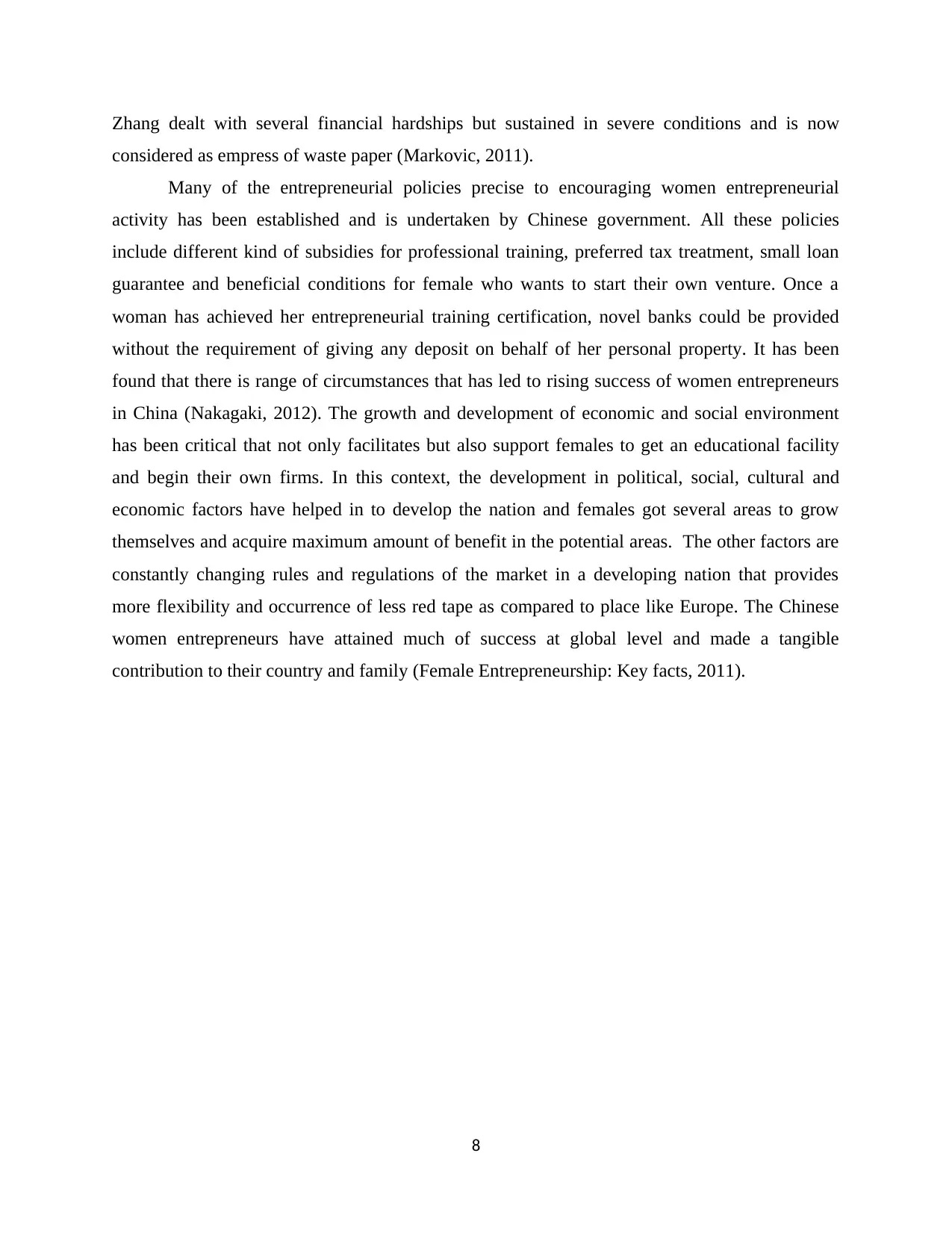
Zhang dealt with several financial hardships but sustained in severe conditions and is now
considered as empress of waste paper (Markovic, 2011).
Many of the entrepreneurial policies precise to encouraging women entrepreneurial
activity has been established and is undertaken by Chinese government. All these policies
include different kind of subsidies for professional training, preferred tax treatment, small loan
guarantee and beneficial conditions for female who wants to start their own venture. Once a
woman has achieved her entrepreneurial training certification, novel banks could be provided
without the requirement of giving any deposit on behalf of her personal property. It has been
found that there is range of circumstances that has led to rising success of women entrepreneurs
in China (Nakagaki, 2012). The growth and development of economic and social environment
has been critical that not only facilitates but also support females to get an educational facility
and begin their own firms. In this context, the development in political, social, cultural and
economic factors have helped in to develop the nation and females got several areas to grow
themselves and acquire maximum amount of benefit in the potential areas. The other factors are
constantly changing rules and regulations of the market in a developing nation that provides
more flexibility and occurrence of less red tape as compared to place like Europe. The Chinese
women entrepreneurs have attained much of success at global level and made a tangible
contribution to their country and family (Female Entrepreneurship: Key facts, 2011).
8
considered as empress of waste paper (Markovic, 2011).
Many of the entrepreneurial policies precise to encouraging women entrepreneurial
activity has been established and is undertaken by Chinese government. All these policies
include different kind of subsidies for professional training, preferred tax treatment, small loan
guarantee and beneficial conditions for female who wants to start their own venture. Once a
woman has achieved her entrepreneurial training certification, novel banks could be provided
without the requirement of giving any deposit on behalf of her personal property. It has been
found that there is range of circumstances that has led to rising success of women entrepreneurs
in China (Nakagaki, 2012). The growth and development of economic and social environment
has been critical that not only facilitates but also support females to get an educational facility
and begin their own firms. In this context, the development in political, social, cultural and
economic factors have helped in to develop the nation and females got several areas to grow
themselves and acquire maximum amount of benefit in the potential areas. The other factors are
constantly changing rules and regulations of the market in a developing nation that provides
more flexibility and occurrence of less red tape as compared to place like Europe. The Chinese
women entrepreneurs have attained much of success at global level and made a tangible
contribution to their country and family (Female Entrepreneurship: Key facts, 2011).
8
Paraphrase This Document
Need a fresh take? Get an instant paraphrase of this document with our AI Paraphraser
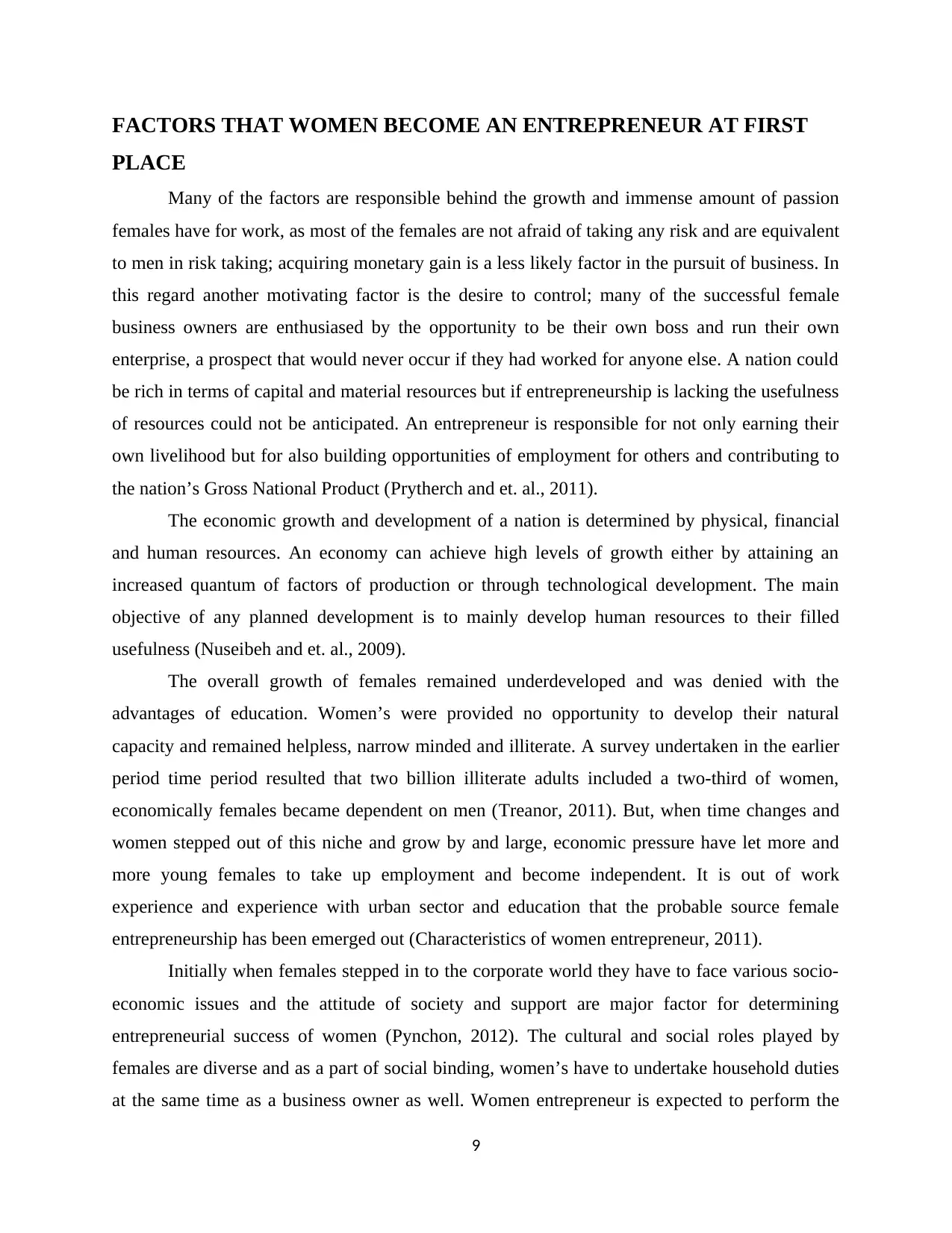
FACTORS THAT WOMEN BECOME AN ENTREPRENEUR AT FIRST
PLACE
Many of the factors are responsible behind the growth and immense amount of passion
females have for work, as most of the females are not afraid of taking any risk and are equivalent
to men in risk taking; acquiring monetary gain is a less likely factor in the pursuit of business. In
this regard another motivating factor is the desire to control; many of the successful female
business owners are enthusiased by the opportunity to be their own boss and run their own
enterprise, a prospect that would never occur if they had worked for anyone else. A nation could
be rich in terms of capital and material resources but if entrepreneurship is lacking the usefulness
of resources could not be anticipated. An entrepreneur is responsible for not only earning their
own livelihood but for also building opportunities of employment for others and contributing to
the nation’s Gross National Product (Prytherch and et. al., 2011).
The economic growth and development of a nation is determined by physical, financial
and human resources. An economy can achieve high levels of growth either by attaining an
increased quantum of factors of production or through technological development. The main
objective of any planned development is to mainly develop human resources to their filled
usefulness (Nuseibeh and et. al., 2009).
The overall growth of females remained underdeveloped and was denied with the
advantages of education. Women’s were provided no opportunity to develop their natural
capacity and remained helpless, narrow minded and illiterate. A survey undertaken in the earlier
period time period resulted that two billion illiterate adults included a two-third of women,
economically females became dependent on men (Treanor, 2011). But, when time changes and
women stepped out of this niche and grow by and large, economic pressure have let more and
more young females to take up employment and become independent. It is out of work
experience and experience with urban sector and education that the probable source female
entrepreneurship has been emerged out (Characteristics of women entrepreneur, 2011).
Initially when females stepped in to the corporate world they have to face various socio-
economic issues and the attitude of society and support are major factor for determining
entrepreneurial success of women (Pynchon, 2012). The cultural and social roles played by
females are diverse and as a part of social binding, women’s have to undertake household duties
at the same time as a business owner as well. Women entrepreneur is expected to perform the
9
PLACE
Many of the factors are responsible behind the growth and immense amount of passion
females have for work, as most of the females are not afraid of taking any risk and are equivalent
to men in risk taking; acquiring monetary gain is a less likely factor in the pursuit of business. In
this regard another motivating factor is the desire to control; many of the successful female
business owners are enthusiased by the opportunity to be their own boss and run their own
enterprise, a prospect that would never occur if they had worked for anyone else. A nation could
be rich in terms of capital and material resources but if entrepreneurship is lacking the usefulness
of resources could not be anticipated. An entrepreneur is responsible for not only earning their
own livelihood but for also building opportunities of employment for others and contributing to
the nation’s Gross National Product (Prytherch and et. al., 2011).
The economic growth and development of a nation is determined by physical, financial
and human resources. An economy can achieve high levels of growth either by attaining an
increased quantum of factors of production or through technological development. The main
objective of any planned development is to mainly develop human resources to their filled
usefulness (Nuseibeh and et. al., 2009).
The overall growth of females remained underdeveloped and was denied with the
advantages of education. Women’s were provided no opportunity to develop their natural
capacity and remained helpless, narrow minded and illiterate. A survey undertaken in the earlier
period time period resulted that two billion illiterate adults included a two-third of women,
economically females became dependent on men (Treanor, 2011). But, when time changes and
women stepped out of this niche and grow by and large, economic pressure have let more and
more young females to take up employment and become independent. It is out of work
experience and experience with urban sector and education that the probable source female
entrepreneurship has been emerged out (Characteristics of women entrepreneur, 2011).
Initially when females stepped in to the corporate world they have to face various socio-
economic issues and the attitude of society and support are major factor for determining
entrepreneurial success of women (Pynchon, 2012). The cultural and social roles played by
females are diverse and as a part of social binding, women’s have to undertake household duties
at the same time as a business owner as well. Women entrepreneur is expected to perform the
9
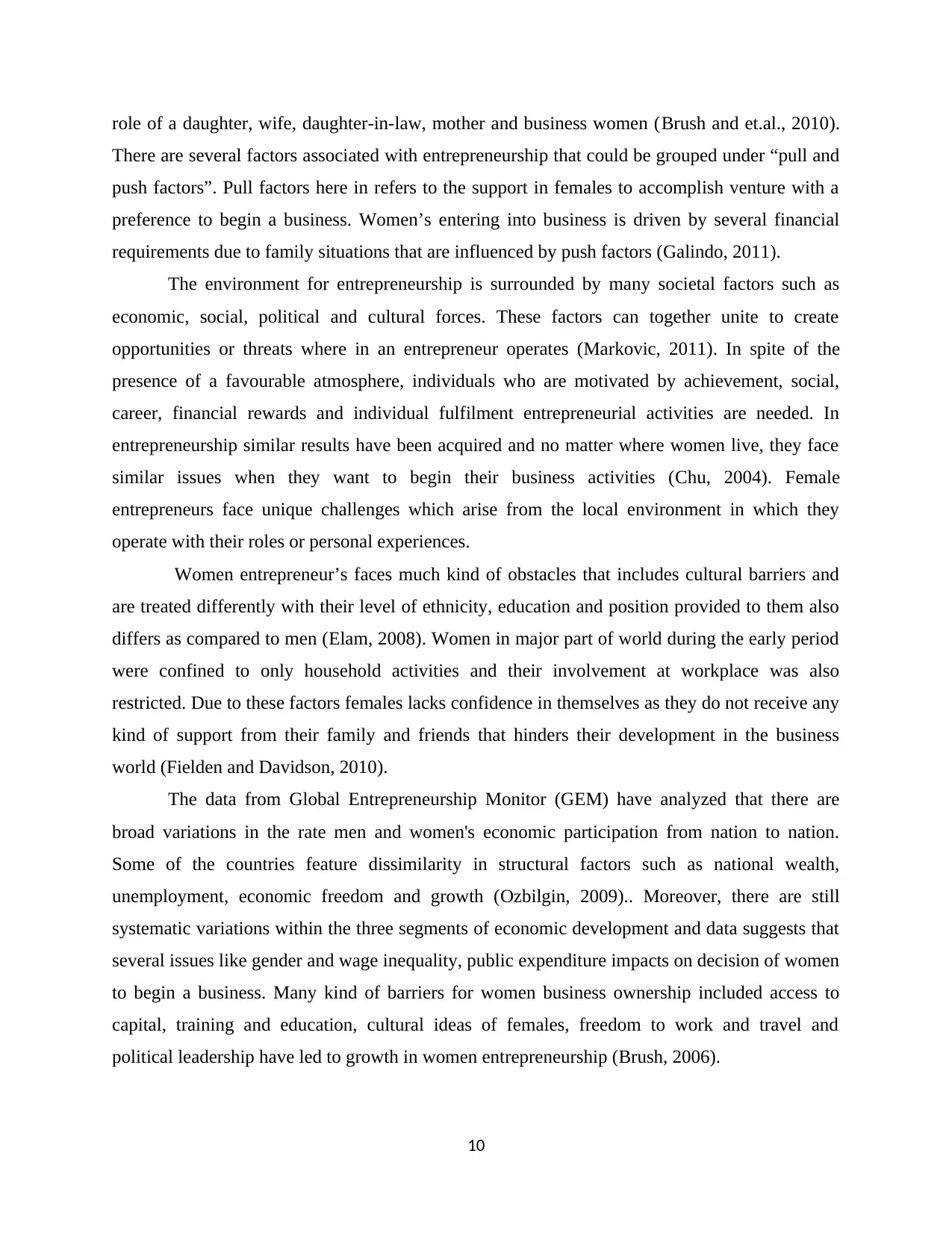
role of a daughter, wife, daughter-in-law, mother and business women (Brush and et.al., 2010).
There are several factors associated with entrepreneurship that could be grouped under “pull and
push factors”. Pull factors here in refers to the support in females to accomplish venture with a
preference to begin a business. Women’s entering into business is driven by several financial
requirements due to family situations that are influenced by push factors (Galindo, 2011).
The environment for entrepreneurship is surrounded by many societal factors such as
economic, social, political and cultural forces. These factors can together unite to create
opportunities or threats where in an entrepreneur operates (Markovic, 2011). In spite of the
presence of a favourable atmosphere, individuals who are motivated by achievement, social,
career, financial rewards and individual fulfilment entrepreneurial activities are needed. In
entrepreneurship similar results have been acquired and no matter where women live, they face
similar issues when they want to begin their business activities (Chu, 2004). Female
entrepreneurs face unique challenges which arise from the local environment in which they
operate with their roles or personal experiences.
Women entrepreneur’s faces much kind of obstacles that includes cultural barriers and
are treated differently with their level of ethnicity, education and position provided to them also
differs as compared to men (Elam, 2008). Women in major part of world during the early period
were confined to only household activities and their involvement at workplace was also
restricted. Due to these factors females lacks confidence in themselves as they do not receive any
kind of support from their family and friends that hinders their development in the business
world (Fielden and Davidson, 2010).
The data from Global Entrepreneurship Monitor (GEM) have analyzed that there are
broad variations in the rate men and women's economic participation from nation to nation.
Some of the countries feature dissimilarity in structural factors such as national wealth,
unemployment, economic freedom and growth (Ozbilgin, 2009).. Moreover, there are still
systematic variations within the three segments of economic development and data suggests that
several issues like gender and wage inequality, public expenditure impacts on decision of women
to begin a business. Many kind of barriers for women business ownership included access to
capital, training and education, cultural ideas of females, freedom to work and travel and
political leadership have led to growth in women entrepreneurship (Brush, 2006).
10
There are several factors associated with entrepreneurship that could be grouped under “pull and
push factors”. Pull factors here in refers to the support in females to accomplish venture with a
preference to begin a business. Women’s entering into business is driven by several financial
requirements due to family situations that are influenced by push factors (Galindo, 2011).
The environment for entrepreneurship is surrounded by many societal factors such as
economic, social, political and cultural forces. These factors can together unite to create
opportunities or threats where in an entrepreneur operates (Markovic, 2011). In spite of the
presence of a favourable atmosphere, individuals who are motivated by achievement, social,
career, financial rewards and individual fulfilment entrepreneurial activities are needed. In
entrepreneurship similar results have been acquired and no matter where women live, they face
similar issues when they want to begin their business activities (Chu, 2004). Female
entrepreneurs face unique challenges which arise from the local environment in which they
operate with their roles or personal experiences.
Women entrepreneur’s faces much kind of obstacles that includes cultural barriers and
are treated differently with their level of ethnicity, education and position provided to them also
differs as compared to men (Elam, 2008). Women in major part of world during the early period
were confined to only household activities and their involvement at workplace was also
restricted. Due to these factors females lacks confidence in themselves as they do not receive any
kind of support from their family and friends that hinders their development in the business
world (Fielden and Davidson, 2010).
The data from Global Entrepreneurship Monitor (GEM) have analyzed that there are
broad variations in the rate men and women's economic participation from nation to nation.
Some of the countries feature dissimilarity in structural factors such as national wealth,
unemployment, economic freedom and growth (Ozbilgin, 2009).. Moreover, there are still
systematic variations within the three segments of economic development and data suggests that
several issues like gender and wage inequality, public expenditure impacts on decision of women
to begin a business. Many kind of barriers for women business ownership included access to
capital, training and education, cultural ideas of females, freedom to work and travel and
political leadership have led to growth in women entrepreneurship (Brush, 2006).
10
⊘ This is a preview!⊘
Do you want full access?
Subscribe today to unlock all pages.

Trusted by 1+ million students worldwide
1 out of 29
Related Documents
Your All-in-One AI-Powered Toolkit for Academic Success.
+13062052269
info@desklib.com
Available 24*7 on WhatsApp / Email
![[object Object]](/_next/static/media/star-bottom.7253800d.svg)
Unlock your academic potential
Copyright © 2020–2025 A2Z Services. All Rights Reserved. Developed and managed by ZUCOL.





